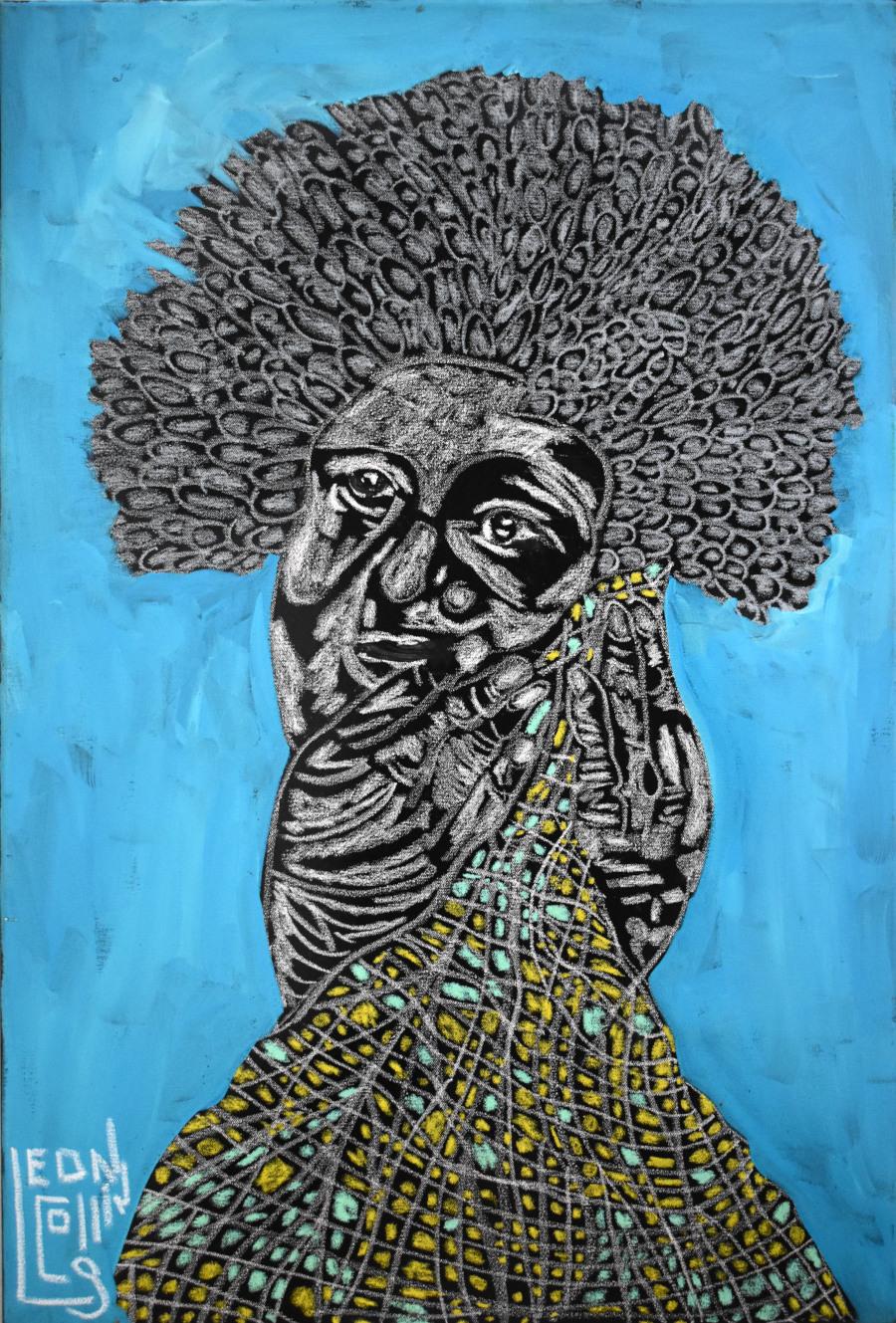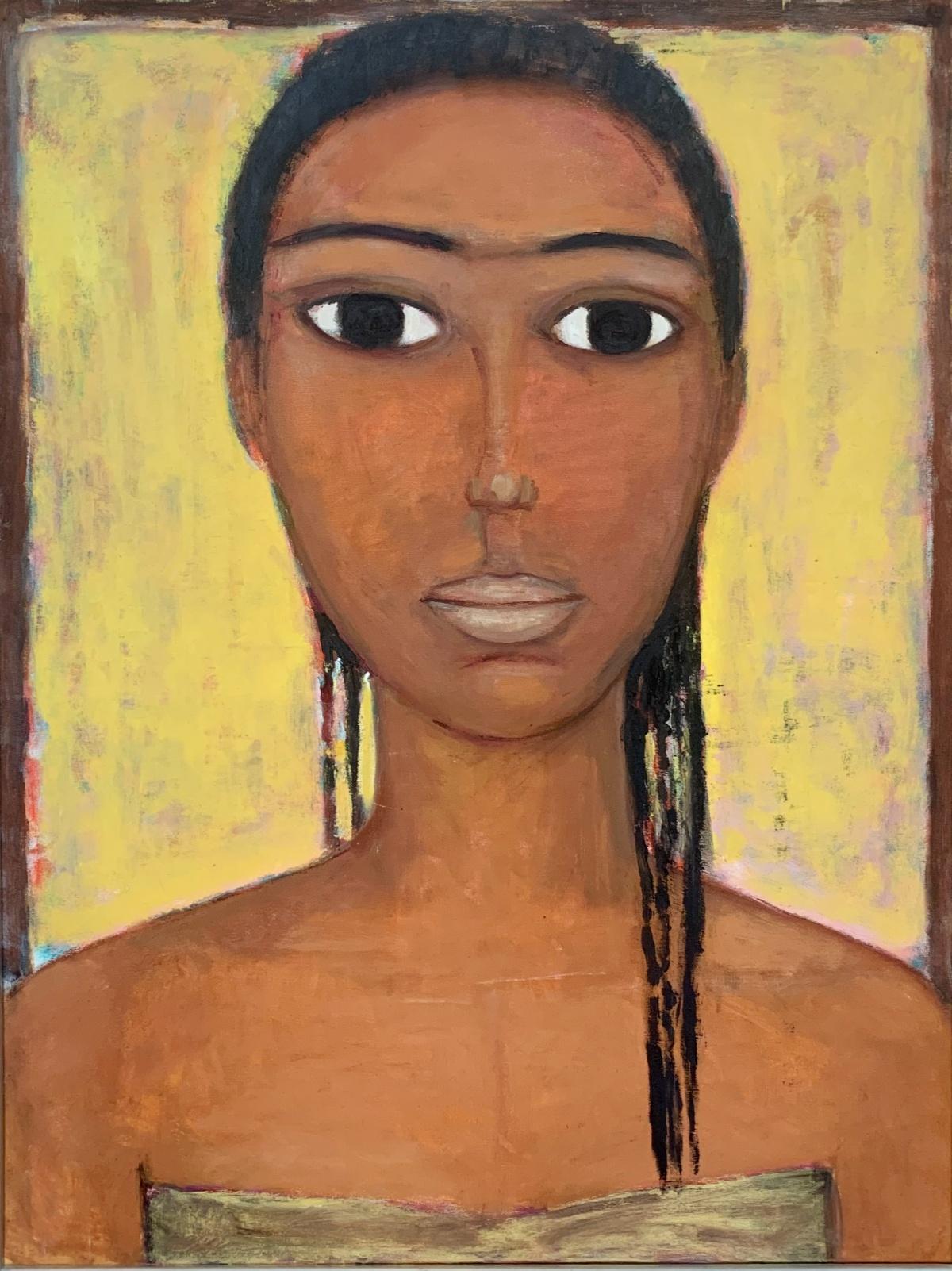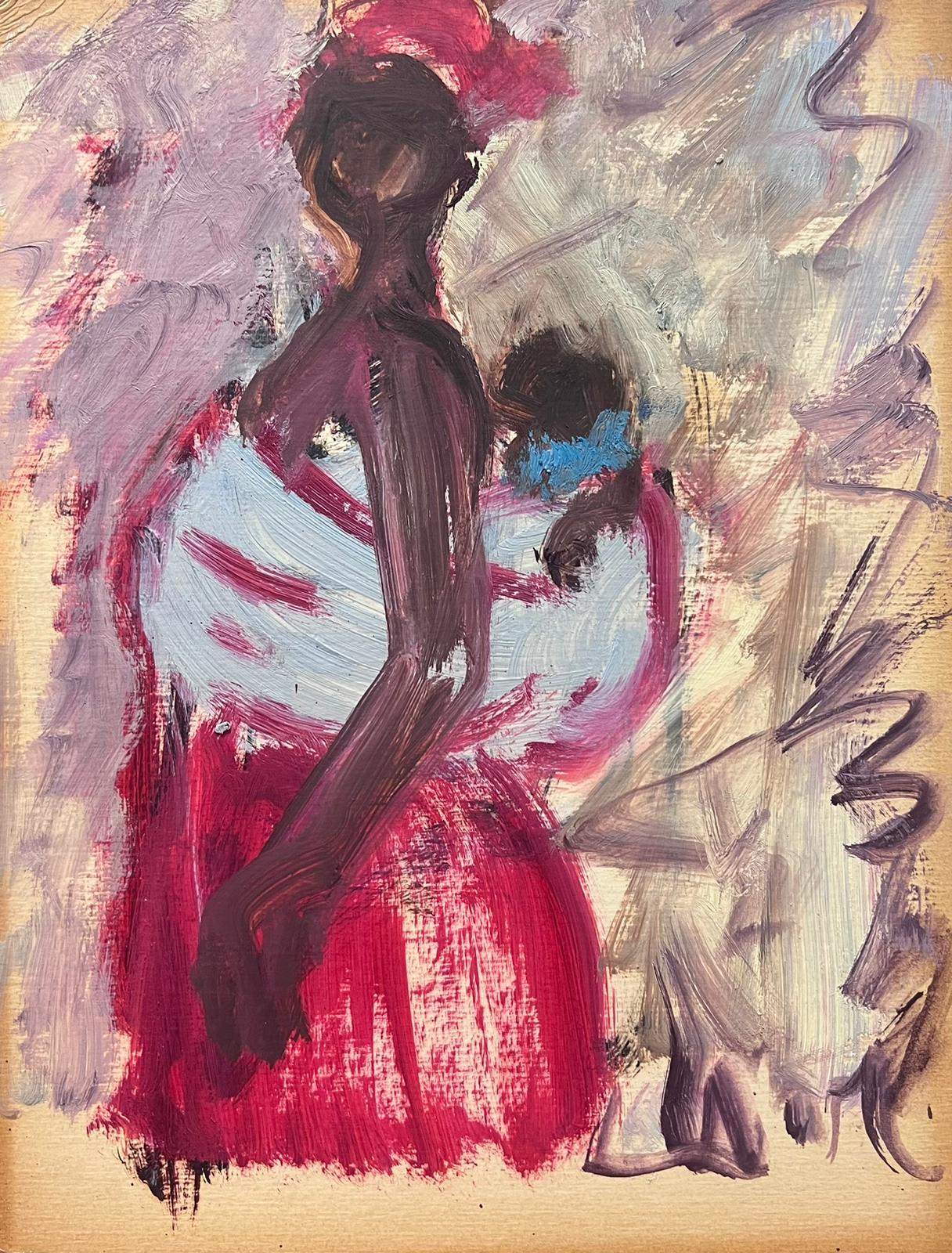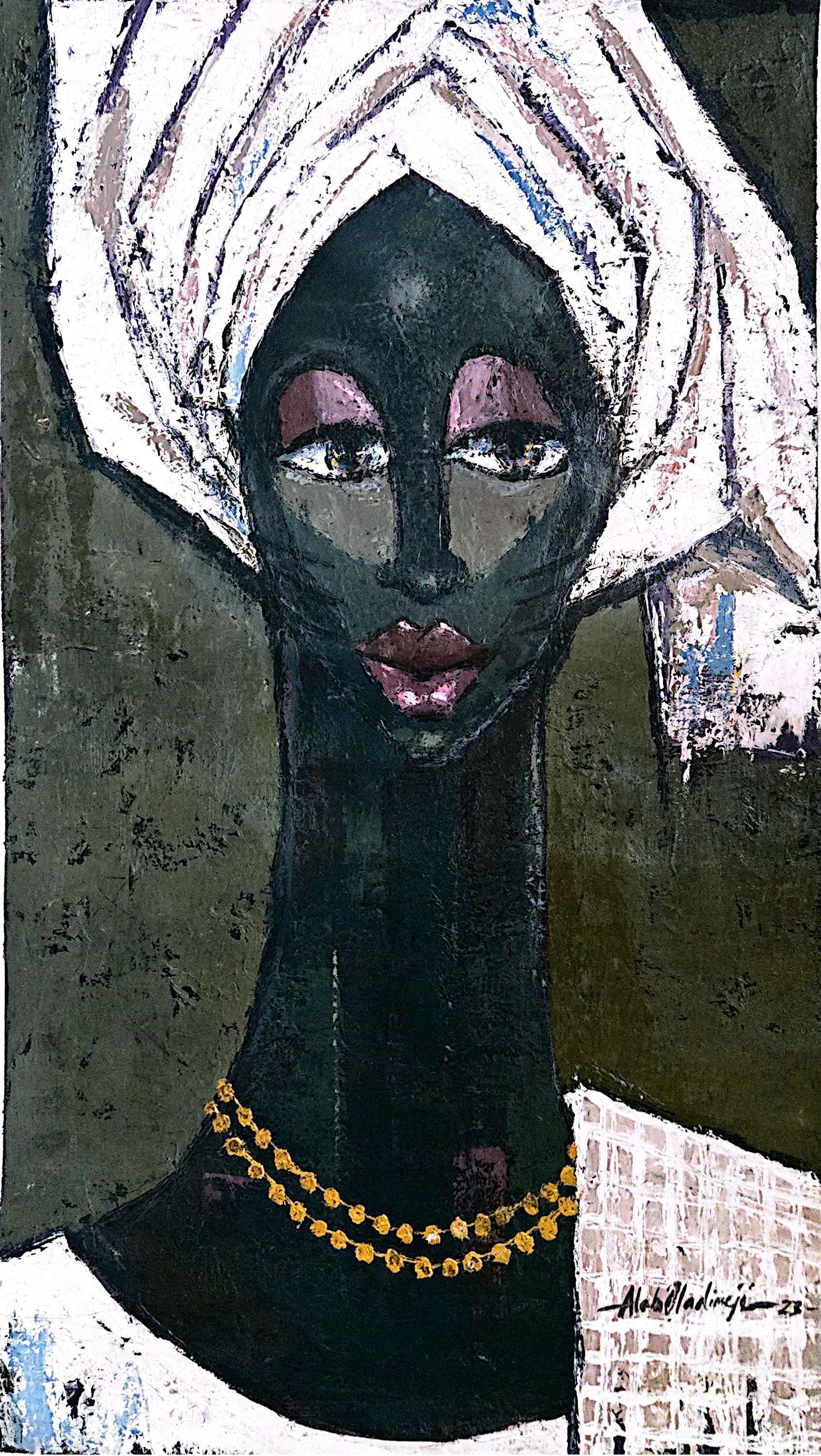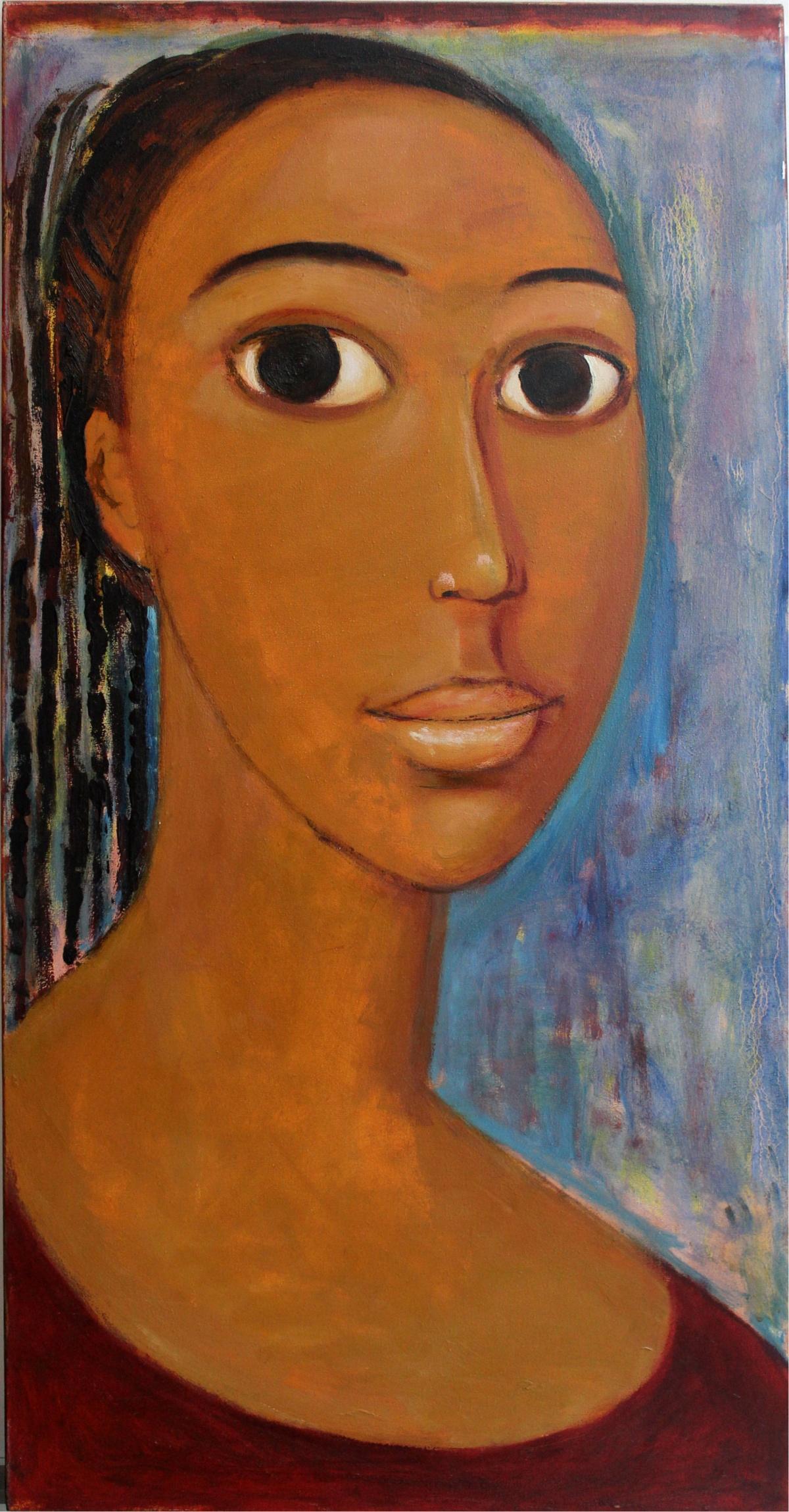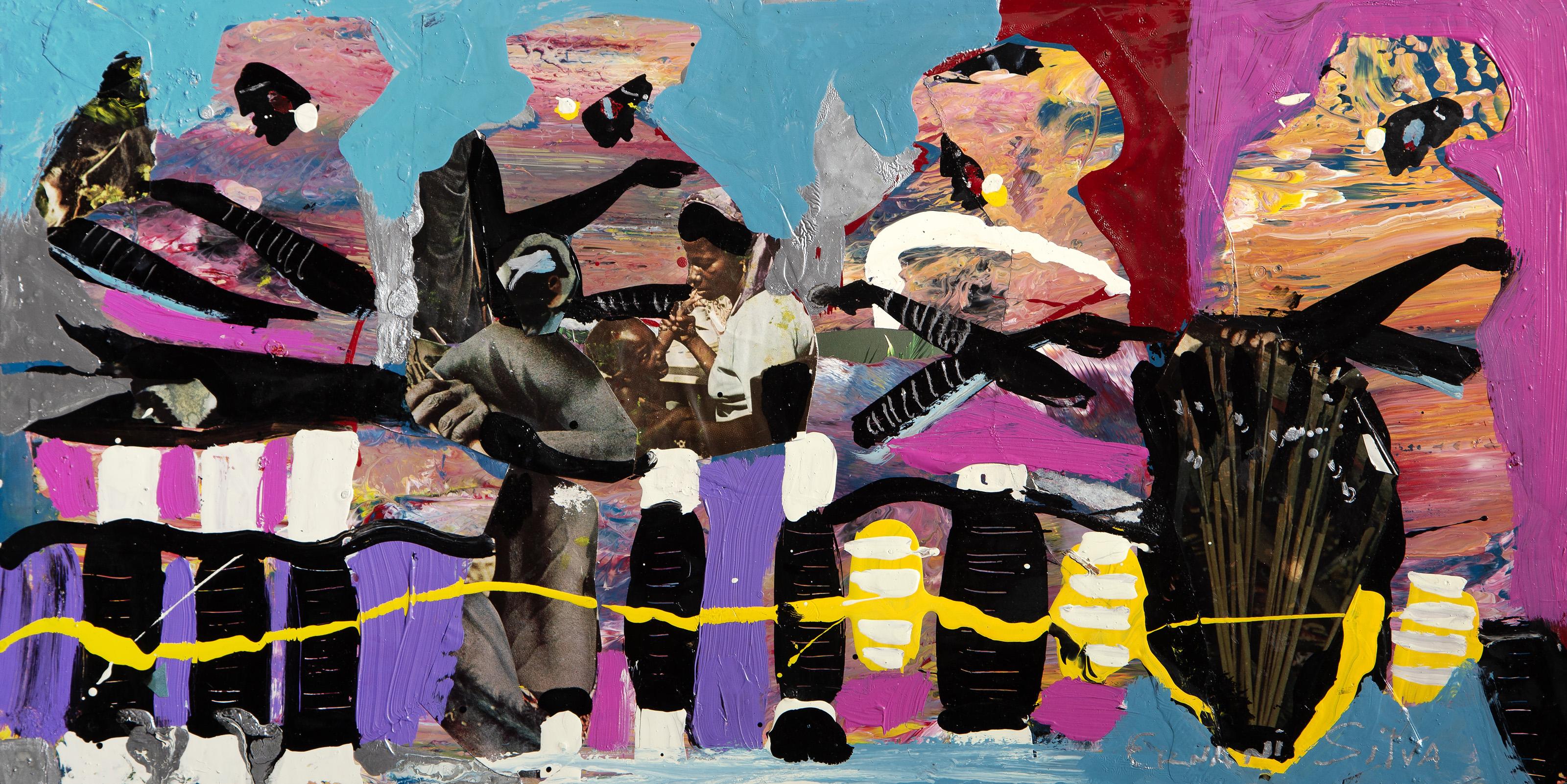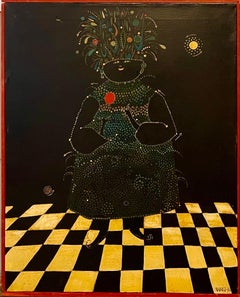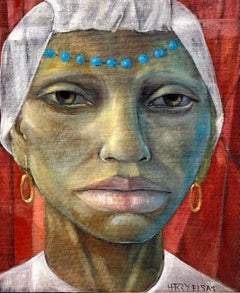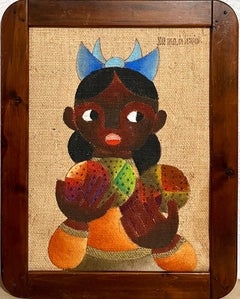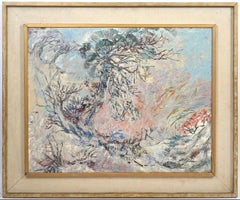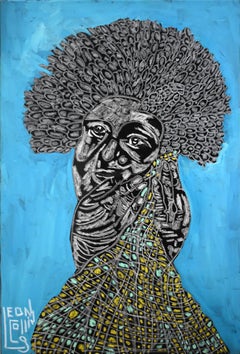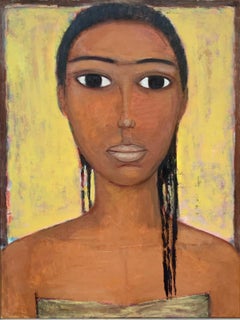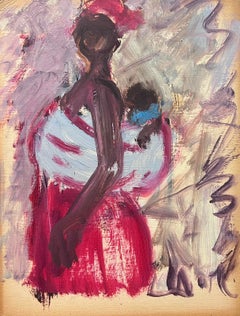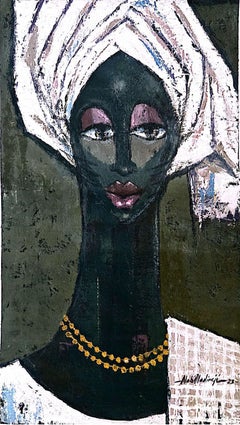Items Similar to 1970 Haitian Mod Gold Painting Portrait of African American Woman Emilcar Simil
Want more images or videos?
Request additional images or videos from the seller
1 of 15
Emilcar Similien (SIMIL)1970 Haitian Mod Gold Painting Portrait of African American Woman Emilcar Simil1970
1970
$15,000
£11,381.65
€13,013.90
CA$20,950.93
A$23,294.59
CHF 12,163.15
MX$283,551.84
NOK 155,196.47
SEK 145,411.67
DKK 97,125.17
Shipping
Retrieving quote...The 1stDibs Promise:
Authenticity Guarantee,
Money-Back Guarantee,
24-Hour Cancellation
About the Item
Feu de Joie
1970
hand signed and dated.
Measurements: 25.75 X 25.75 Framed. Image is 23.75 X 23.75
Emilcar Similien, known as Simil was born in 1944 in St. Marc. He finished elementary school in St. Marc and high school in Port-au-Prince. From 1965 until 1971 he studied at the Academy of Beaux-Arts in Port-au-Prince, where he took courses in painting, sculpture, and art history. Simil uses his images of women only as means for displaying patterns, color, and the sparkle of gold jewelry on black skin. He paints with acrylics on Masonite of any size. His surfaces are smooth and polished. Simil delights in beauty, elegance, and grace. This is done in a silhouette style reminiscent of Kara Walker.
Emilcar Simil (Similcar) is known for Acrylic painting in high colors of black skinned female figures. He is of the generation of Haitian artists that include Bernard Sejourne, Prospere Pierre-Louis, Levoy Exil, Louisiane Saint Fleurant, Henri Calixte, Paul Dieuseul, Laurent Casimir, Frantz Zephirin, Denis Smith, Philton Latortue, Philome Obin, Préfète Duffaut, Fernand Pierre, Dieudonne L Cedor. Since 1971 he has taught art history and aesthetics at the Academy of Beaux-Arts. He is also an honorary teacher at the private school Juan Vasquez. In 1974, he traveled to the United States to meet American artists and visit major museums. Simil was influenced by Art nouveau and his favorite artist, Gustav Klimt. These influences are most obvious in his paintings of women. Like Bernard Sejourne, Simil delights in beauty, elegance, and grace. But instead of concentrating on pose, he uses his images of women only as vehicles for displaying pattern, color, and the sparkle of gold jewelry on black skin. Only recognizable as females by their contours, their features are not distinguished. There is a playfulness of line that is very different from Sejourne's emphasis on monumentality.
Emilcar Similien uses his images of women only as means for displaying patterns, color, and the sparkle of gold jewelry on black skin. He paints with acrylics on Masonite of any size. His surfaces are smooth and polished. Simil delights in beauty, elegance, and grace. He has been exhibiting since 1969 namely in Haiti, USA, Denmark.
As Art Critic, Gerald Alexis states in his book Peintres Haitiens "well trained by masters who taught him to excel in his forms, Similien’s works also contain discrete messages” .
EXHIBITIONS
1969- Academie des Beaux Arts
1970- Haitian-American Institute
1971- Salon Dante Alighieri, Amb. d'Italie, Port-au-Prince
1972- Christ, Saut-d'Eau
1973- Anderson and Hopkins Gallery, Washington, D.C.
1974- Galerie Mehu, Petion-Ville
1974- Musee d'Art Haitien, Port-au-Prince
1976- Galerie Monnin, One Man Show, Port-au-Prince
1977- Martello Museum, Key West, Florida
1978- Galleriet, Copenhagen, Denmark
1978-1979 - Haitian Art - Brooklyn Museum, New York, Milwaukee Art Center, Wisconsin, Kunst aus Haiti, Berlin, Germany, New Orleans Museum of Art, Louisiana
1978- Brooklyn College, New York
1978- Musee d'Art Haitien, Port-au-Prince
1979 - Haiti, Musee d'Art (Third Generation Artists)
1979- Kunst aus Haiti, West Berlin, Germany
1980- Curacao Museum, Willemstad, Curacao
1981- Sotheby Parke Bernet Auction, New York, NY
1982- Galerie Monnin Third Generation Artists
1982- Exhibit Vorpal Gallery, San Francisco
1982- Centre de Arte Cultural, Italy
1982- International Art Expo, New York, NY
1983- Musee International d'Art Naif, Nice, France
1983- Galerie Bukowskis, Zurich, Switzerland
1984- Exhibit Metropolitan Museum of Art
1985- Galerie Bukowskis, Zurich, Switzerland
1985- Cafe de la Paix Exposition, Paris, France
1986- Three Man Show, Port-au-Prince
1988- Galerie 93, Paris, France
1989- IFA Galerie und Kontaktstelle, Bonn, Germany
1990- Exposition du Palais du Rhin, Strasbourg, France
1992- La Rencontre Des Deux Mondes Vue Par Les Peintres D'Haiti - Martinique, Seville, Rome, Paris, Nantes, Angouleme, Laval, Toulouse, Japan, Montreal, United States, Mexico
Haitian art is a complex tradition, reflecting African roots with strong Indigenous, American and European aesthetic and religious influences. Many artists cluster in "schools" of painting, such as the Cap-Haïtien school, which features depictions of daily life in the city, the Jacmel School, which reflects the steep mountains and bays of that coastal town, or the Saint-Soleil School. Centre d’Art, located in Port-au-Prince, Haiti, was founded in 1944 by American watercolorist DeWitt Peters and several prominent Haitians from the intellectual and cultural circles including: Maurice Borno, Andrée Malebranche, Albert Mangonès, Lucien Price, and Georges Remponeau. Popular artists of this movement include: André Pierre, Hector Hippolyte, Castera Bazile, Wilson Bigaud and Rigaud Benoit. Saint Soleil School, also known as "Movement Saint-Soleil" was founded in 1973 as a rural arts community called Soisson-la-Montagne, in Pétion-Ville, Haiti. This community was started by Jean-Claude Garoute and Maud Robart and they encouraged the academic study of painting.
After Saint Soleil School disbanded, five remaining members of the school were renamed "Cinq Soleil" and include: Levoy Exil, Prosper Pierre Louis, Louisiane Saint Fleurant, Dieuseul Paul, Denis Smith. A second generation member is Magda Magloire, the daughter of Louisiane Saint Fleurant.
- Creator:Emilcar Similien (SIMIL) (1944, Haitian)
- Creation Year:1970
- Dimensions:Height: 25.75 in (65.41 cm)Width: 25.75 in (65.41 cm)
- Medium:
- Movement & Style:
- Period:
- Condition:good. minor wear. original frame has some wear. please see photos.
- Gallery Location:Surfside, FL
- Reference Number:1stDibs: LU38212024242
About the Seller
4.9
Platinum Seller
Premium sellers with a 4.7+ rating and 24-hour response times
Established in 1995
1stDibs seller since 2014
1,784 sales on 1stDibs
Typical response time: <1 hour
- ShippingRetrieving quote...Shipping from: Surfside, FL
- Return Policy
Authenticity Guarantee
In the unlikely event there’s an issue with an item’s authenticity, contact us within 1 year for a full refund. DetailsMoney-Back Guarantee
If your item is not as described, is damaged in transit, or does not arrive, contact us within 7 days for a full refund. Details24-Hour Cancellation
You have a 24-hour grace period in which to reconsider your purchase, with no questions asked.Vetted Professional Sellers
Our world-class sellers must adhere to strict standards for service and quality, maintaining the integrity of our listings.Price-Match Guarantee
If you find that a seller listed the same item for a lower price elsewhere, we’ll match it.Trusted Global Delivery
Our best-in-class carrier network provides specialized shipping options worldwide, including custom delivery.More From This Seller
View AllAlabama Surreal Folk Art Oil Painting African American Woman, Flower Headdress
By Maltby Sykes
Located in Surfside, FL
The painting is signed Sykes and dated 1960 lower right.
It has "Maltby Sykes, 1911- for Leon" written on the stretcher verso
It is a Surrealist Folk Art figure of an African woman oil painting...
Category
1960s Folk Art Figurative Paintings
Materials
Canvas, Oil
Expressionist African American Woman Portrait German Brazilian Harry Elsas
Located in Surfside, FL
Framed 20.5 x 18 image 14.5 x 12
Heinz Hugo Erich Elsas, (German-Brazilian 1925-1994) later known as Harry Elsas. Muralist, writer, designer best known as a painter.
Born in 1925 in Stuttgart, Germany, 1n 1936 At the age of 14 he moved with his family to Sao Paulo, Brazil fleeing from World War II and of the persecution of the Jews. A self taught artist he was influenced by the Flemish artists, his work reveals remarkable influence of Brueghel and Hieronymus Bosch. He worked in the workshop of Portinari, participating in the Tiradentes mural. His work went through a post-Expressionist phase, culminating in the adoption of cubism and is characterized by the habit of creating a three-dimensional structure before painting a picture. In 1945, he was working with Lasar Segall...
Category
20th Century Expressionist Figurative Paintings
Materials
Oil, Board
Folk Art Mexican Girl Oil Painting on Burlap Charming Naive African American Art
By Jose Maria de Servin
Located in Surfside, FL
Framed 29 X 23
Image 18 X 24
The sweetness that characterizes the work of Mexican painter Jose Maria de Servin (1917-83) is a melancholy and placid one. While he worked in the most modern of styles, he adapted it to an anecdotal folk-art approach distinctly his own.
When he was an infant, de Servin's family moved with him to Guadalajara. A city of history and culture, Guadalajara had a thriving artistic community with strong connections to Europe. His brothers Antonio and Miguel became artists as well, and in later years they worked collaboratively. As a teenager, de Servin studied at one of Mexico's Schools of Open-Air Painting, free art-teaching institutions sponsored by the government.
Later de Servin became a pupil of the painter Chucho Reyes, known for his improvisational watercolor variations on traditional Mexican themes. This interest in imagery particular to Mexico would be of great significance to de Servin. De Servin also studied under the more traditional painter Jose Vizcarra. In the early 1930s de Servin joined the Pintores Jovenes de Jalisco, or Young Painters of Jalisco.
An influence of critical importance to de Servin was Pablo Picasso. One of the originators of Cubism, the Spanish painter soon departed from its quasi-scientific and optical basis to create lively and humorous geometrical abstractions. It was this Cubism, personal and decorative, that de Servin adopted. His earliest Cubist works mimic Picasso, while during the second stage of his career, his works become smooth and polished, with an emphasis on gentle surface textures.
After these cautious years, however, a rough boldness enters along with dominating colors of earth and sand. Modernists like de Servin were interested in exploring what they considered primitive artmaking styles. The adoption of a native manner and native themes is in keeping with Modernist tenets, as is the use of nontraditional materials. De Servin's portraits of peasants, large-eyed and simply rendered, recall children's drawings. The rough burlap ground contrasts with the playful imagery and delicate range of color. The figures, all children or child-like adults, are all curves and simple shapes arranged harmoniously. De Servin's cubism is free from grotesquerie as it celebrates the simplicity of its subjects.
De Servin worked with the social-realist Jose Orozco on several large mural commissions in Guadalajara, including one at the Legislative Palace. While their styles were dissimilar, both made use of Mexican imagery to glorify the common people. A sought-after muralist in his own right, de Servin brought the rich colors and endearing characters of his panels to his larger-scale work.
For 15 years, de Servin taught summer art classes at the University of Arizona. His career was marked by many one-man shows, both in North America and Europe. In recent years, his striking style has attracted increased notice from critics and the public.
His style is a unique conglomerate of tradition, history, legends, heroes, old customs and folklore. It is a self-standing style, recognizable, cheerful, whimsical and a happy creation. Naïve art is any form of visual art that is created by a person who lacks the formal education and training that a professional artist undergoes (in anatomy, art history, technique, perspective, ways of seeing). Unlike folk art, naïve art does not necessarily evince a distinct cultural context or tradition. Naïve art is recognized, and often imitated, for its childlike simplicity and frankness. Paintings of this kind typically have a flat rendering style with a rudimentary expression of perspective.
One particularly influential painter of "naïve art" was Henri Rousseau (1844–1910), a French Post-Impressionist who was discovered by Pablo Picasso. Naïve art is often seen as outsider art that is by someone without formal (or little) training or degree. While this was true before the twentieth century, there are now academies for naïve art. Naïve art is now a fully recognized art genre, represented in art galleries worldwide.
Museums devoted to naïve art now exist in Kecskemét, Hungary; Riga, Latvia; Jaen, Spain; Rio de Janeiro, Brasil; Vicq France and Paris. "Primitive art" is another term often applied to art by those without formal training, but is historically more often applied to work from certain cultures that have been judged socially or technologically "primitive" by Western academia, such as Native American, sub saharan African or Pacific Island art (see Tribal art). This is distinguished from the self-conscious, "primitive" inspired movement primitivism. Another term related to (but not completely synonymous with) naïve art is folk art. There also exist the terms "naïvism" and "primitivism" which are usually applied to professional painters working in the style of naïve art (like Paul Gauguin, Mikhail Larionov, Paul Klee).
At all events, naive art can be regarded as having occupied an "official" position in the annals of twentieth-century art since - at the very latest - the publication of the Der Blaue Reiter, an almanac in 1912. Wassily Kandinsky and Franz Marc, who brought out the almanac, presented 6 reproductions of paintings by le Douanier' Rousseau (Henri Rousseau), comparing them with other pictorial examples. However, most experts agree that the year that naive art was "discovered" was 1885, when the painter Paul Signac became aware of the talents of Henri Rousseau and set about organizing exhibitions of his work in a number of prestigious galleries. The Earth Group (Grupa Zemlja) were Croatian artists, architects and intellectuals active in Zagreb from 1929 to 1935. The group included the painters Krsto Hegedušić, Edo Kovačević, Omer Mujadžić, Kamilo Ružička, Ivan Tabaković, and Oton Postružnik, the sculptors Antun Augustinčić, Frano Kršinić, and the architect Drago Ibler. A term applied to Yugoslav (Croatian) naive painters working in or around the village of Hlebine, near the Hungarian border, from about 1930. Some of the best known naive artists are Dragan Gaži, Ivan Generalić, Josip Generalić, Krsto Hegedušić, Mijo Kovačić, Ivan Lacković-Croata, Franjo Mraz, Ivan Večenaj and Mirko Virius. Camille Bombois (1883–1970) Ferdinand Cheval, known as 'le facteur Cheval' (1836–1924) Henry Darger (1892–1973) L. S. Lowry (1887–1976) Grandma Moses, Anna Mary Robertson (1860–1961) Nikifor (1895–1968) Poland, Horace Pippin (1888–1946) Jon Serl (1894-1993) United States Alfred Wallis (1855–1942) Scottie Wilson (1890–1972) Gesner Abelard...
Category
Mid-20th Century Folk Art Figurative Paintings
Materials
Burlap, Oil
Florida Oil Painting African American Woman Art Annie Nobles Miller Indian River
Located in Surfside, FL
"Annie Nobles Miller"
Abstract Florida landscape oil on board painting
Hand signed lower left Inscribed on verso St. Lucie County.
Measures: Board 24"H x 30"W; Framed - 32"H x 38"W.
Annie Miller was a member of the Indian River School of Painting, which was not a formal school but was a group of mostly African-American Florida working class people who wanted to paint. Following is the explanation of that school and its participants. Indian River School is a name applied to Floridian artists in the 1950's and 1960's. They were heavily influenced by nature. Most of the artists in this movement were African American. Their work is characterized by quick strokes and eschews traditional methods of paintings. The main influence for the group was a man named A.E. Backus, a Bohemian white man who mentored the group of young black artists. The group used to congregate in his studio and learnt to paint from 'Beanie' (as he was called) as a way out of their lower class labour jobs. Their work was powerful, dramatic yet captured the serenity and beauty of the Florida
Although the exact count of artists mentored by A.E. Backus remains unknown, experts estimate it to be around 20 individuals, many of whom he supported through college.
Albert Ernest "Beanie" Backus (1906–1990) was famous for his vivid, naturalist Florida landscapes capturing a fast-vanishing Florida wild lands. Backus would come to be seen as the seminal Florida landscape painter, and others who followed would emulate him. Primarily of the Indian River and Everglades areas of Florida. Backus was a Native Floridian artist of great importance recreating scenes of Florida's sky, rivers, ocean, back country, unpredictable weather, clouds, and birds. Born in Fort Pierce, FL to a family of talented boat designers and builders. His "Uncle" Reg Goodwin helped Backus as a young painter go to the Parsons School of Fine Art in New York in 1924. He was referred to as “Florida’s painter laureate,” and the “Dean of Florida’s landscape painters.”In addition to his influence on the Florida Highwaymen painters (Alfred Hair...
Category
1960s Abstract Abstract Paintings
Materials
Oil, Board
Abstract Acrylic Mix Media Painting Cheryl Warrick African American Woman Artist
Located in Surfside, FL
Cheryl Warrick (American, b. 1956),
"Build a nest" 1998,
Acrylic and mixed media painting on paper,
Hand signed, titled and dated verso, matted and framed.
(I have not opened thi...
Category
1990s Abstract Mixed Media
Materials
Mixed Media, Acrylic
Large Italian Modernist Surrealist Lady Mod Oil Painting "La Ragazza Ungherese"
By Lazzaro Donati
Located in Surfside, FL
Lazzaro Donati (Italian, 1926-1977), Framed oil painting "La Ragazza Ungherese" The Hungarian Girl. Dated 1961.
Framed: 36.25 x 28.5 inches. In good condition.
Lazzaro Donati was b...
Category
1960s Surrealist Figurative Paintings
Materials
Canvas, Oil
You May Also Like
"VISION IN MY MIND BIG MAMA" BLACK FOLK ARTIST Leon collins
By Leon Collins
Located in San Antonio, TX
Leon Collins
Birthdate Unknown
Galveston / Navasota Texas Artist
Image Size: 36 x 24
Medium: Acrylic on Canvas
"Vision in my Mind Big Mama"
Leon Collins Birthdate Unknown
"The inspir...
Category
21st Century and Contemporary Impressionist Figurative Paintings
Materials
Acrylic
Kenyan's portrait - Afro American, Figurative oil painting, Female portrait
By Marlena Nizio
Located in Warsaw, PL
ARTIST:
MARLENA NIZIO (1959-2021) Studied painting under prof. Jerzy Nowosielski at the Academy of Fine Arts in Cracow. She received her diploma in 1...
Category
2010s Other Art Style Figurative Paintings
Materials
Canvas, Oil
20th Century German Modernist Oil Painting Portrait of African Woman
Located in Cirencester, Gloucestershire
Artist: Elisabeth Hahn (German 1924-2021),
Elisabeth Hahn was born in Dortmund, Germany, where she began her artistic studies. In 1953, she moved to Paris. She continued her studie...
Category
20th Century Modern Figurative Paintings
Materials
Oil
Iyalode (Women Leader) -21st Century Contemporary, Figurative, Africa
Located in Ibadan, Oyo
Shipping Procedure
Ships in a well-protected tube from Nigeria
This work is unique, not a print or other type of copy.
Accompanied by a Certificate of Authenticity (Issued by the Gal...
Category
21st Century and Contemporary Contemporary Figurative Paintings
Materials
Canvas, Acrylic
$2,680 Sale Price
20% Off
Portrait - XXI century, Afro American- Oil figurative painting,
By Marlena Nizio
Located in Warsaw, PL
ARTIST:
MARLENA NIZIO (1959-2021) Studied painting under prof. Jerzy Nowosielski at the Academy of Fine Arts in Cracow. She received her diploma in 19...
Category
2010s Other Art Style Figurative Paintings
Materials
Canvas, Oil
Mother and Child, Folk Art Acrylic Painting by Ernani Silva
Located in Long Island City, NY
Ernani Silva, Brazilian - Mother and Child, Medium: Acrylic, Collage and Enamel on board, signed in marker lower right, Size: 10.75 x 21 in. (27.31 x 53.34 cm)
Category
1990s Folk Art Figurative Paintings
Materials
Enamel
More Ways To Browse
1944 Portraits
Silhouette Portrait
Portrait Of Danish
Portrait Of Maurice
Japanese Woman Portrait
Danish Modern Gold Jewelry
Copenhagen Jewellery Vintage
Claude Bernard
Laurent 1976
Wilson Jewellery
Gerald Peters
Gustav Klimt Jewelry
Paul Peters
Georges Louis Claude
Henri Deux
Vintage Jewellery Montreal
Kara Walker
Les Bernard Jewelry Vintage
